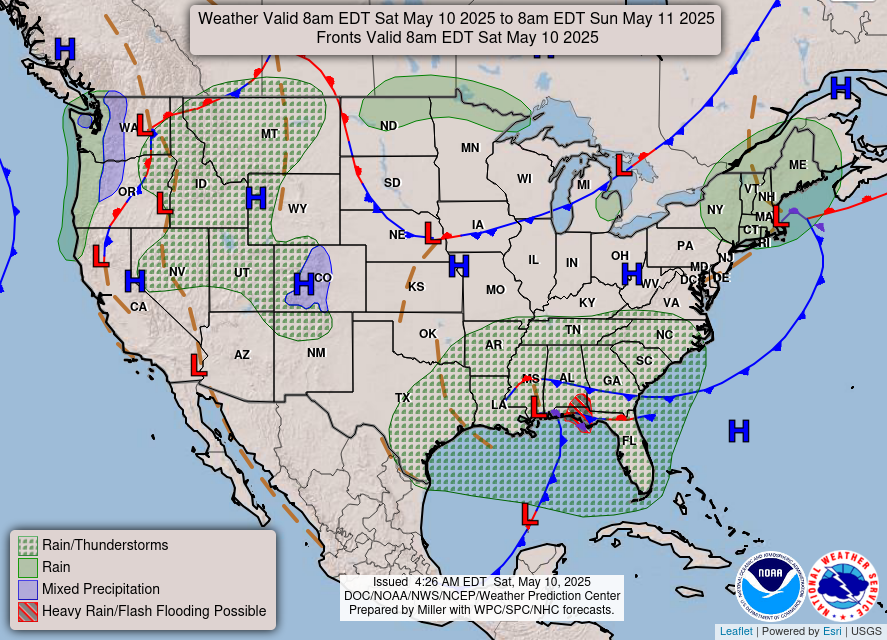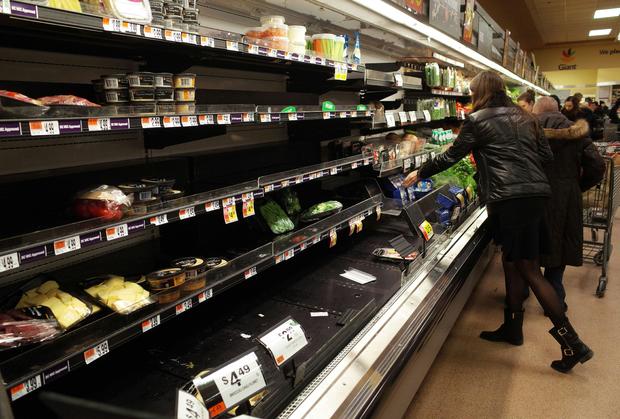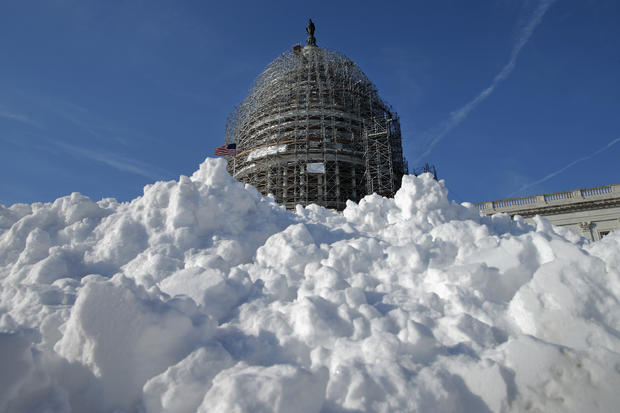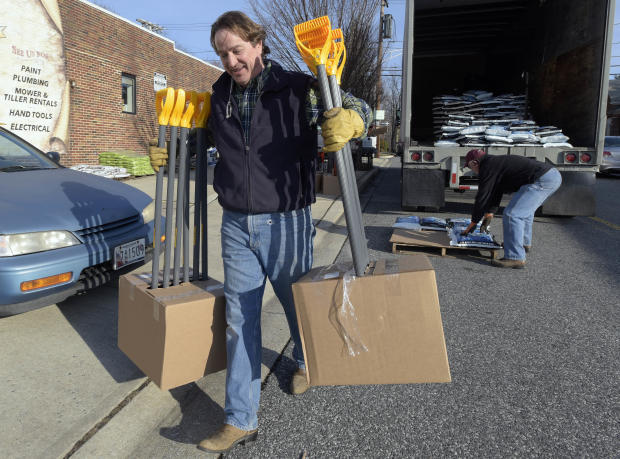East Coast hunkers down as massive blizzard looms
WASHINGTON -- The commuter chaos caused by a light dusting of snow in the nation's capital was an ominous prelude to the massive blizzard bearing down on the eastern United States on Thursday.
As the massive blizzard looms over much of the Eastern U.S., people are already hunkering down. Ahead of the storm, thousands of flights have been cancelled and the D.C. Metro system plans to shut down.
States of emergency were declared in North Carolina, Virginia, Maryland and Pennsylvania, where road crews were out in force Thursday. Blizzard watches were in effect along the storm's path, from Arkansas through Tennessee and Kentucky to the mid-Atlantic states and as far north as New York.
The director of the National Weather Service said all the ingredients have come together to create blizzards with brutally high winds, dangerous inland flooding, white-out conditions and even the possibility of thunder snow, when lightning strikes through a snowstorm.
The snowfall, expected to continue from late Friday into Sunday, could easily cause more than $1 billion in damage and paralyze the Eastern third of the nation, weather service director Louis Uccellini sad.
"It does have the potential to be an extremely dangerous storm that can affect more than 50 million people," Uccellini said at the service's Weather Prediction Center in College Park, Maryland.
Washington looks like the bull's-eye of the blizzard, and New York City is just inside the slow-moving storm's sharp northern edge, which means it is likely to see heavy accumulations, Uccellini said. Boston will probably get off easy this time, forecasters said.
Weather Prediction Center meteorologist Paul Kocin, who with Uccellini wrote a two-volume textbook on northeast snowstorms, estimated more than 2 feet for Washington, a foot to 18 inches for Philadelphia and eight inches to a foot in New York.

The snowfall could be as heavy as 1 to 3 inches per hour, and continue for 24 hours or more, Kocin said.
That could put this snowstorm near the top 10 to hit the East, with the weekend timing and days of warning helping to limit deaths and damage, said Kocin, who compared it to "Snowmageddon," the first of two storms that "wiped out" Washington in 2010 and dumped up to 30 inches of snow in places.
Unfortunately, more than just snow is coming. Uccellini said it won't be quite as bad as Superstorm Sandy, but people should expect high winds, a storm surge and inland flooding from Delaware to New York. Other severe but non-snowy weather is likely from Texas to Florida as the storm system chugs across the Gulf Coast, gaining moisture.
Less than an inch of snow fell Wednesday night in the District of Columbia, Maryland and northern Virginia, but that was enough for roads to immediately freeze over, causing hundreds of accidents and leaving drivers gridlocked for hours. President Obama wasn't spared, as his motorcade slowly weaved and skidded along icy streets to the White House.
The mayor apologized to the city, saying more trucks should have been sent out to lay salt ahead of the snow -- a mistake she said won't be repeated ahead of the much bigger storm arriving Friday.
"We are very sorry for (our) inadequate response," District of Columbia Mayor Muriel Bowser said. "We should have been out earlier, with more resources."
The sorry preview raised concerns among people scrambling to prepare for up to 2 feet of heavy wet snow and blizzard conditions across the Mid-Atlantic region. Icy conditions already caused accidents that killed two drivers in North Carolina and one in Tennessee. A truck with a snowplow killed a pedestrian while it was snowing in Maryland.
"It's going to be dangerous out there," said Tonya Woods, 42, a Metro station manager. She had a much longer-than-usual drive home to suburban Clinton, Maryland, on Wednesday night, and worries that Friday will be much worse. "I say they should shut things down," she said.
Late Thursday, she got her wish. The federal government announced that its offices would be closing at noon Friday. The capital's subway system announced earlier in the day that it will shut down entirely late Friday night and remain closed through Sunday for the sake of employee and rider safety. Underground stations usually stay open during major snowstorms.
Most major school districts in the region either closed Thursday or opened late. Bowser announced that the district schools would pre-emptively close on Friday, and that city offices would close at noon, hours ahead of the storm.
A State of Emergency for Washington D.C. was issued and will go in effect Friday after the morning commute at 9:30 a.m., CBS affiliate WUSA reported.
WUSA reported that crews are pretreating the roads Thursday in order to prepare for the next snow and to avoid the driving conditions that drivers experienced Wednesday night.
Quentin Norman, a manager at a gas station and convenience store in Capitol Heights, Maryland, just outside Washington, said his commute home Wednesday took an hour instead of the usual 15 minutes. The traffic and storm "kind of took us by surprise," he said.
Maryland Gov. Larry Hogan has issued a state of emergency in Maryland ahead of the storm, reported CBS Baltimore.
"The season's first significant winter storm is becoming more and more imminent and is expected to have a big, if not major, impact on the mid-Atlantic region," said CBS Baltimore Meteorologist Chelsea Ingram.
Kentucky's legislature cancelled its Friday session ahead of an expected 14 inches of snow.
New York Mayor Bill de Blasio warned residents not to be taken off guard by the milder-than-normal winter the city has seen so far.
"Anyone who has the illusion that they're going to be taking big trips on Saturday and Sunday, get that out of your mind. It's not happening," de Blasio said. "I think people need to take this very seriously and recognize that this is a real thing."
High winds could make it miserable outdoors even where smaller amounts of snow are expected. Forecasters warned of 30 mph winds in Manhattan on Saturday and coastal flooding in New Jersey.
But Boston, which bore the brunt of massive snowstorms last year, is expected to get just a few inches. If that forecast holds, Mayor Marty Walsh said Thursday that he would lend Bowser two new truck-mounted snow blowers to help clear the capital's streets.
The strongest winds and potentially life-threatening blizzard conditions are expected Friday night through Saturday night, making driving very dangerous along the Interstate 95 corridor.
Train service could be disrupted as well, by frozen switches, the loss of third-rail electric power or trees falling on overhead wires. About 1,000 track workers will be deployed to keep New York City's subway system moving, and 79 trains will have "scraper shoes" to reduce icing on the rails, the Metropolitan Transit Authority said.
FlightAware.com said airlines had cancelled 2,191 flights on Friday, and that the number was expected to rise. Another 1,452 Saturday flights had already been cancelled by Thursday night.
"We expect Saturday's cancellations to grow considerably, likely doubling or more," FlightAware said in a statement.
All major airlines have issued waivers for travel over the weekend, allowing passengers to rebook onto earlier or later flights to avoid the storms. The airports included vary by carrier, but American Airlines, for example, has canceled most of its Friday and Saturday flights in the eastern U.S., including all 654 flights at its hub in Charlotte, N.C. American's flights should resume on Sunday at the three Washington and Baltimore area airports and New York's three airports, the company said.
Philadelphia International is no stranger to travel nightmares.
"We're prepared for the worst," Keith Burne, the deputy director of operations, told CBS News' David Begnaud.
"I consider a very cheap insurance policy, we're going to have people here and we're going to be staffed up ready to go," Burne said.
In and around the nation's capital on Thursday, roads were mostly treated and clear for the morning rush hour, but some elevated roads, ramps and side streets remained icy, forcing drivers to inch along. In Virginia, police responded to 767 crashes over a 24-hour period ending early Thursday, including a trooper hit by a car sliding out-of-control, spokeswoman Corinne Geller said.
The snow grounded the helicopter Mr. Obama usually uses to travel from Andrews Air Force Base to the White House, and it took the presidential motorcade about an hour and 14 minutes to travel the 15 miles. The SUVs passed four accidents, and was repeatedly forced to stop, skidding sideways on the ice until a curb kept their wheels on the road.
Some Maryland road crews got stuck in lengthy backups Wednesday night, slowing their progress. Crews also struggled to keep up in Virginia, where Gov. Terry McAuliffe warned people Thursday to take seriously the threat of the coming storm, and stay home if possible until it passes.
Chrissy Wiginton, 35, who works as an editor at the Smithsonian, said her walk across the National Mall Thursday morning made her doubt the governments' preparations.
"I was really surprised by how bad the sidewalks were," she said. "It was really icy."
One major event in Washington was still on: the March for Life, an annual anti-abortion rally that's usually one of the largest events on the National Mall. It will be held Friday, the anniversary of the Supreme Court's Roe v. Wade decision.
At least three deaths were blamed on the Wednesday storm.
In North Carolina, a 60-year-old woman driving her car in Stokes County near her home around 5:45 p.m. Wednesday hit an "extremely icy" patch, went down an embankment and turned over in a creek, the state Highway Patrol said. Mary Williams was killed in the accident. In neighboring Forsyth County, 55-year-old Rosa McCollough-Leake was killed when she slid on an icy roadway, crossed into oncoming traffic and hit a pickup truck head-on.
In Tennessee, a car slid off the roadway due to speed and slick conditions, killing the driver and injuring a passenger, the Knox County sheriff's department said.
Arlington County officials said the region "underestimated" the storm and it was a "scary and frustrating night" for residents.
The storm will bring ice and freezing rain to Arkansas, Tennessee and Kentucky starting Thursday, prediction center meteorologist Rich Otto said Wednesday.
"There's a lot of details that are yet to be seen," Otto said. "Subtle changes can make a big difference. We've seen that in storms in the past."



